Iran's Foreign Minister Visits Saudi Arabia Thursday
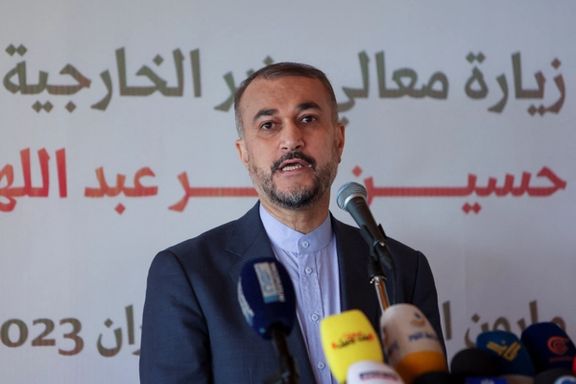
Iran Foreign Minister Hossein Amir-Abdollahian departed from Tehran on a visit to Saudi Arabia on Thursday, Iranian state media reported.

Iran Foreign Minister Hossein Amir-Abdollahian departed from Tehran on a visit to Saudi Arabia on Thursday, Iranian state media reported.
In June, Saudi Arabian Foreign Minister Prince Faisal bin Farhan met with Iranian officials in Tehran on his first visit to the country after the resumption of diplomatic ties with the Islamic Republic in March.
The two countries had no diplomatic relations for seven years from January 2016 when government-backed Iranian mobs attacked and ransacked Saudi missions after Riyadh executed a pro-Iran Shiite cleric. Saudi Arabia cut diplomatic ties after the incidents.
In March, Iran and Saudi Arabia agreed in a China-brokered deal to end the diplomatic rift and reestablish relations following years of hostility that had endangered regional stability in the Persian Gulf, as well as in Yemen, Syria and Lebanon.
The official government news agency IRNA reported that Iran’s first ambassador in more than seven years accompanies the foreign minister. Earlier this week Amir-Abdollahian announced that the Saudi ambassador will soon arrive in Tehran and the two embassies are already staffed.
The United States has been engaged in an effort to normalize ties between Saudi Arabia and Israel to expand the Abraham Accords launched under the Trump administration in 2020, when the United Arab Emirates and Bahrain, close Saudi allies, established ties with Israel.
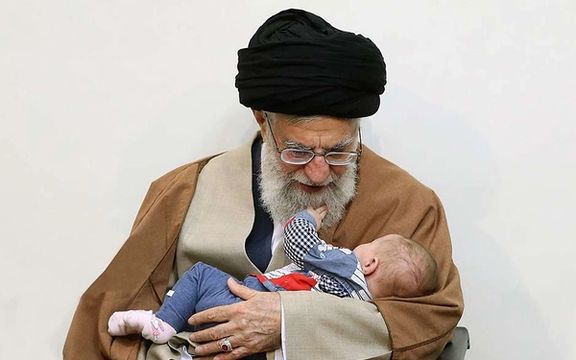
A new ban in Iran on screening kits for congenital anomalies has worried many who fear a sudden surge in the number of children being born with birth defects.
The health ministry’s food and drug administration website announced last week that it will no longer issue permits for production or imports of pregnancy associated plasma protein-A (PAPP-A) and free beta human chorionic gonadotropin (Beta-hCG) test kits.
Media have also reported that the ministry has been refusing to allow production or importation of enzyme linked immunosorbent assay (ELISA) tests.
These tests usually carried out during the first trimester of pregnancies are used to identify and assess the risk of various congenital conditions such as Down Syndrome and fetal aneuploidy (chromosomal anomalies) such as trisomy.
When asked about the discontinuation of the production and imports of these kits on Monday, the ministry spokesman, Pedram Pak-Ayeen, claimed that there was no ban and fetal screening has only been “standardized”.
The spokesman’s denial of the ban does not seem to be convincing to many including genetics experts and women’s rights activists who say denying them to women to preclude possibility of abortion is interfering in people’s personal decisions and violates women’s right to their bodies.
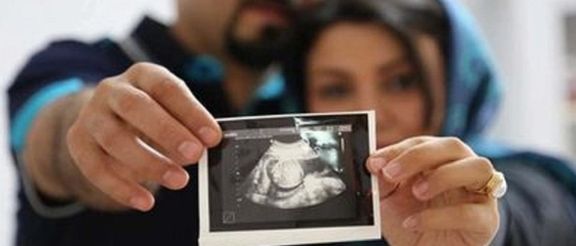
Calling the ministry’s decision “shocking”, Dr Mohammad-Amin Tabatabei, a member of the board of directors of the Iranian Genetics Society, said Monday that Iranians will be facing a greater risk of babies born with congenital and genetic anomalies due to the ban.
Tabatabaei stressed that the ministry has not consulted the genetics society and that the society will officially protest to the decision soon and demand a re-evaluation and warned that the ban could result in illegal imports of “notoriously expensive kits of uncertain standards.”
“Until now we had underground abortions, now we are going to have underground screening too,” a medical professional, Dr Mohammad Mir-Mohammadkhan, said in a post on X (former Twitter) Sunday.
Abortions have always been illegal in Iran, but termination was allowed during the first 18 weeks of pregnancy if the fetus was diagnosed with genetic disorders or carrying the fetus to term threatened the mother’s health or life.
On April 17, Soleiman Haydari, an official of the health ministry, told the Iranian Students News Agency (ISNA) that annually as many as 10,000 abortions were legally carried out.
In the past ten years the Iranian healthcare system has hugely limited screening tests and legal abortions and completely stopped its decades-old family planning programs.
Iran’s primary healthcare program had introduced several screening tests In 1991 that were routinely carried out as part of the existing mandatory premarital blood tests to prevent and control non-communicable diseases which have now been abandoned.
The government has also banned the sale of contraceptives and taken tough action against doctors and midwives who assisted terminations outside the healthcare system and shut down their clinics.
In July 2022 the health ministry announced that it had established a portal for medical professionals to register all pregnancies as a preventative measure against illegal abortions.
Iran's Supreme Leader Ali Khamenei believes efforts to increase the country's population are among the most urgent duties and essential policies of the Islamic Republic as the leading Shia country in the Muslim world and has repeatedly demanded that the population increase to 150 million.
The childbirth rate in Iran has been steadily declining over the past few decades. In the early 1980s, the population growth rate reached 4.8 percent. This rate has dropped to below one percent in the past decade.
Iran's population has doubled from around 40 million in the early 1980s to 84 million, but a declining birth rate means the median age at 32 is about the same as Saudi Arabia at 31.8, but higher than Iraq at 21.
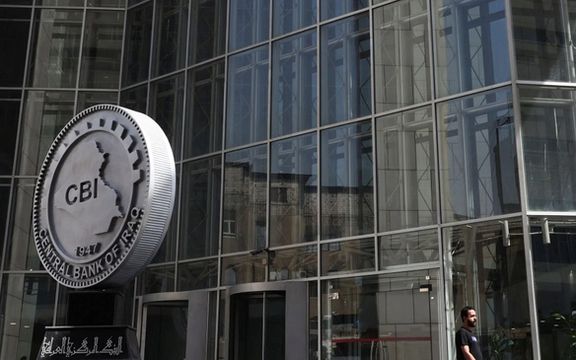
Iraq’s central bank governor Ali al-Allaq says the country has started a war against its banking system being abused for currency smuggling.
"It is really a battle, because the people benefiting from this situation and those harmed (by the new measures) will try in various ways to continue their illegal activities," Allaq told Reuters, referring to implementing US dollar supply restrictions on Iraq to prevent smuggling of banknotes to Iran.
Allaq did not mention Iran by name and said he did not have data on how much of Iraq's dollars has been smuggled to Iran or other neighboring countries, including Turkey and Syria, before the United States tightened regulations in November.
Muhammad Nuri Aziz, a member of the Iraqi parliament, said on a television show last week that Iraqi Prime Minister Mohammed Shia al-Sudani and the country’s central bank are aware of the schemes Iran uses to get hold of US dollars it desperately needs amid US sanctions. The lawmaker noted that the smuggling started during Mustafa Al-Kadhimi's term as prime minister and still continues. Without providing any context or details, the Iraqi lawmaker alleged that Iran prints Iraqi dinars in Argentina, exchanges the money to US dollars in Iraq, from where it is smuggled to Iran by trucks.
Reuters’ Timour Azhari said in a report, “Iraq's government is reliant on Washington's continued goodwill to ensure oil revenues and finances do not face US censure, but it came to power with the support of powerful, Tehran-backed groups and so cannot afford to alienate Iran. The latter groups have accused the US of meddling in Iraq's internal affairs and creating a currency crisis, as businesses either struggling or unwilling to abide by the new measures sourced dollars from exchange shops, driving down the value of the Iraqi dinar.”
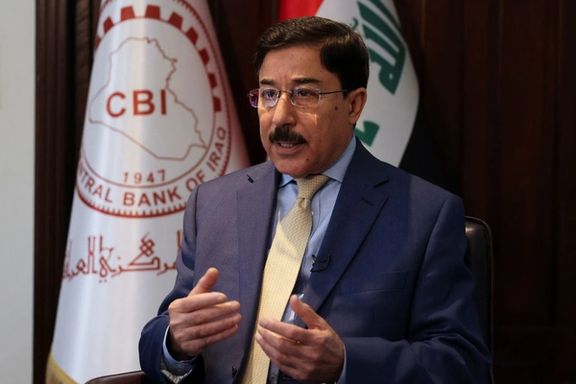
Iraq has more than $100 billion dollars in reserves, Allaq said, but could not freely intervene in the market to bring the rate down due to the restrictions.
Late in July, 14 Iraqi private banks sanctioned by Washington as part of a wider crackdown over helping to siphon US dollars to Iran said they were ready to challenge the measures and face audits and called on Iraqi authorities to provide assistance. The credibility of the Iraqi banking system has been tarnished due to the Islamic Republic's influence, and US financial restrictions have tightened on Baghdad because evidently all Iraqi banks have had interactions with the Islamic Republic.
The US barred the Iraqi banks from conducting dollar transactions as part of a wider crackdown on dollar smuggling to Iran. The latest sanctions, along with earlier ones, have left nearly a third of Iraq's 72 banks blacklisted, two Iraqi central bank officials said. The dinar has been falling against the dollar since the New York Federal Reserve imposed tighter controls on international dollar transactions by commercial Iraqi banks in November to halt the illegal siphoning of dollars to Iran.
Allaq said that action related to transfers from 2022, before a new platform that aimed to improve transparency went live. He said the central bank was undertaking a review of the banking sector and introducing new regulations that he said would likely see some banks close.
"It would be very normal in the coming period to see a reduction in the (number of private banks)," he said. "There are always side-effects, but at the same time we have a responsibility to protect the country's interests by trying to find the necessary means for monitoring and oversight so as not to expose the country to any issues on this front," he said.
'TRANSFORMATION'
The US measures have targeted Iraq's so-called dollar auction, where the central bank requests dollars from the US Federal Reserve before selling them to commercial banks, which in turn sell the funds to businesses in the highly import-dependent economy.
US and Iraqi officials have said the auction allowed large sums of money to be illegitimately acquired by groups who would provide fake invoices and then either transfer or physically smuggle the funds to neighboring countries, chiefly Iran.
A feature of a highly informal economy, the system was also used by thousands of small businesses that are not registered with the state, Allaq said, a widespread phenomenon in Iraq that allows them to dodge taxes and customs fees.
Since January the central bank has asked banks to provide detailed information on senders and recipients of transfers via an online platform.
When companies began trying to use the platform in January, less than 20% of requests were approved by US authorities, Allaq said. That number had now risen to around 85 percent, signaling growing ease with the new regulations, he said.
"It is not just an electronic platform, it will lead to a total reorganization of trade and the movement of money, and control on a lot of avenues for suspicious activity."
(With Reporting by Reuters)
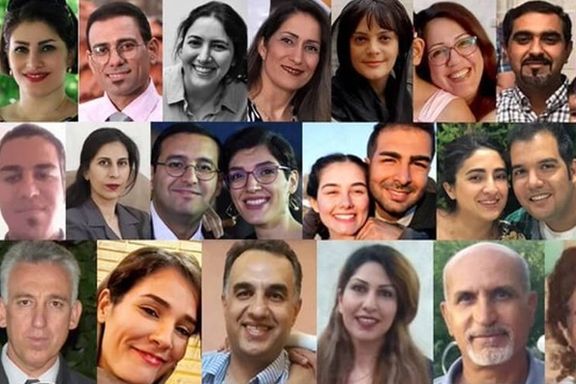
Baha'is around the world are protesting against a recent surge of repression against the Baha'i community in Iran
Nearly 60 members of the minority faith group have been arrested or imprisoned in recent weeks, and 180 further members have been subjected to a relentless campaign of torture.
On Tuesday, the global Baha'i community confirmed that the detained individuals include a 90-year-old man, Jamaloddin Khanjani, who has a history of imprisonment in Iran due to his religious beliefs. He was apprehended along with his daughter, Maria.
Khanjani's previous decade-long imprisonment, from 2008 to 2017, was a result of his affiliation with Yaran, an administrative group established in response to the prohibition of official Baha'i institutions in Iran. The Yaran group, which was dissolved in 2008, sought to cater to the spiritual needs of the community. Each of it seven members were initially handed 20-year sentences, which were later reduced to 10 years and were released in 2018.
Highlighting the escalating repression, Baha'is around the world highlighted the cases of Mahvash Sabet and Fariba Kamalabadi, former members of Yaran. Both women, who were arrested on July 31, 2022, recently received confirmation of their 10-year prison sentences from an appeals court. Sabet, 70, who suffers from severe physical ailments, was among those sentenced. Afif Naimi, another Yaran member who also faced significant health issues, was sentenced to seven years imprisonment.
Meanwhile, the government's crackdown extended to the arrest of nine additional Baha'is on August 13. Accused of disrupting the drug supply, these individuals, including pharmacy owners and employees, had their businesses sealed and closed.
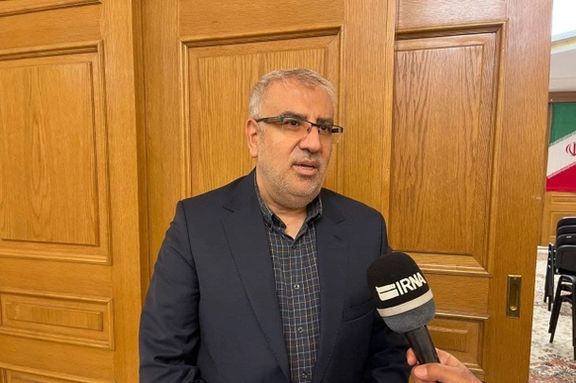
Javad Owji, Iran's Minister of Petroleum, has officially confirmed the suspension of gasoline sales to Iran by Russia.
During a cabinet meeting held on Wednesday, Javad Owji said that Iran’s entire supply of gasoline will now be produced and supplied domestically.
These comments confirm Iran International’s report on Tuesday of the cessation of petrol sales to Iran by Russia.
The ministry's initial plan was to import up to 10 million liters of gasoline from Russia on a daily basis to bridge the gap between production and consumption. In February and March, Russia supplied up to 30,000 tons of gasoline and diesel to Iran, Reuters reported.
Minister Owji not only confirmed the suspension of gasoline imports from Russia, but also acknowledged the existing petrol shortage crisis and the extended queues at fuel stations. Despite the shortages, the minister claimed that there is “no problem in gasoline supply" and stated that, "the parliament has ratified in the budget law that individuals are required to utilize their personal cards for refueling."
The result of Russia’s cessation of supply has led to reductions in gasoline shipments to gas stations and long lines forming with cars rushing to fill their tanks. It has also led to the emergence of a black market for gasoline at significantly inflated prices
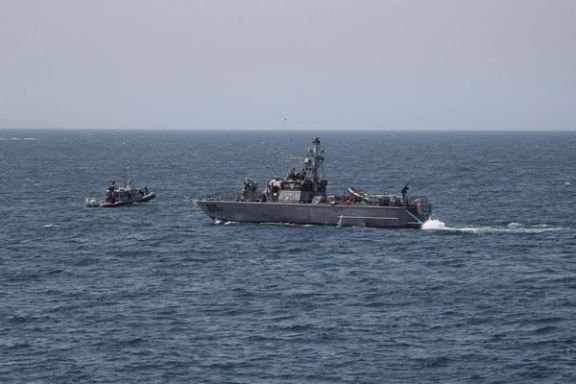
The Israeli and American naval forces have reinforced their military relationship through a two-week collaborative maritime exercise.
The exercise, codenamed Intrinsic Defender, took place off the coast of Haifa and marked the latest installment in a series of joint maneuvers between the Israeli Navy and the US 5th Fleet, which is stationed in the Persian Gulf.
Commander Lt. Ido Niv of the Navy’s Snapir Unit, an integral part of the 914th Patrol Squadron, expressed the strategic importance of fortifying ties with the US Navy. Lt. Niv said that this engagement enabled his unit to refine and elevate its operational capabilities through the exchange of insights and experiences with their American counterparts.
"The Navy carries out numerous exercises aimed at strengthening relationships with countries like the US, Germany, and Italy. The purpose of this drill was to engage in shared learning on specific matters, thereby strengthening relationships. These endeavors greatly benefit the Snapir Unit," Lt. Niv said during a phone interview with The Times of Israel.
During the comprehensive two-week exercise, sailors practiced detection and monitoring at sea, vessel inspection, search and rescue operations, neutralization of hostile vessels, and countering terror activities.
Recent developments in the Persian Gulf have seen increased tensions as the Islamic Revolutionary Guard Corps (IRGC) conducted surprise military exercises on three islands that are subjects of dispute between Iran and the United Arab Emirates earlier this month. Iran has also reportedly attempted to disrupt maritime traffic in the Strait of Hormuz and its adjacent waters
In response, the United States has reinforced its military presence in the region, further intensifying the already complex geopolitical landscape in the area.